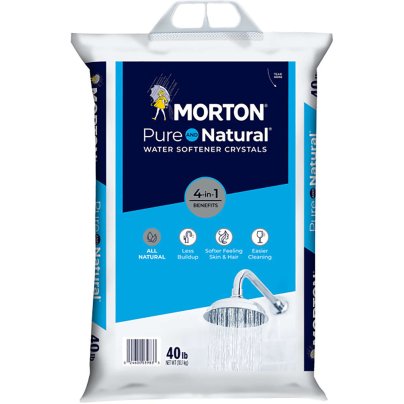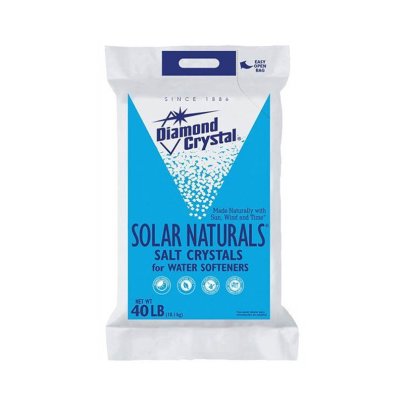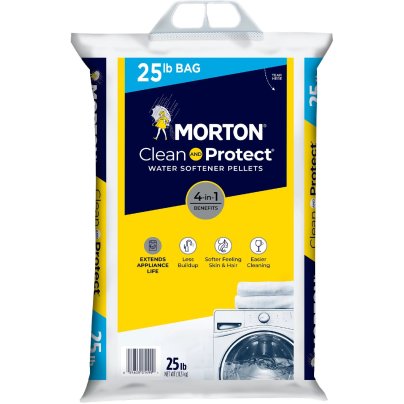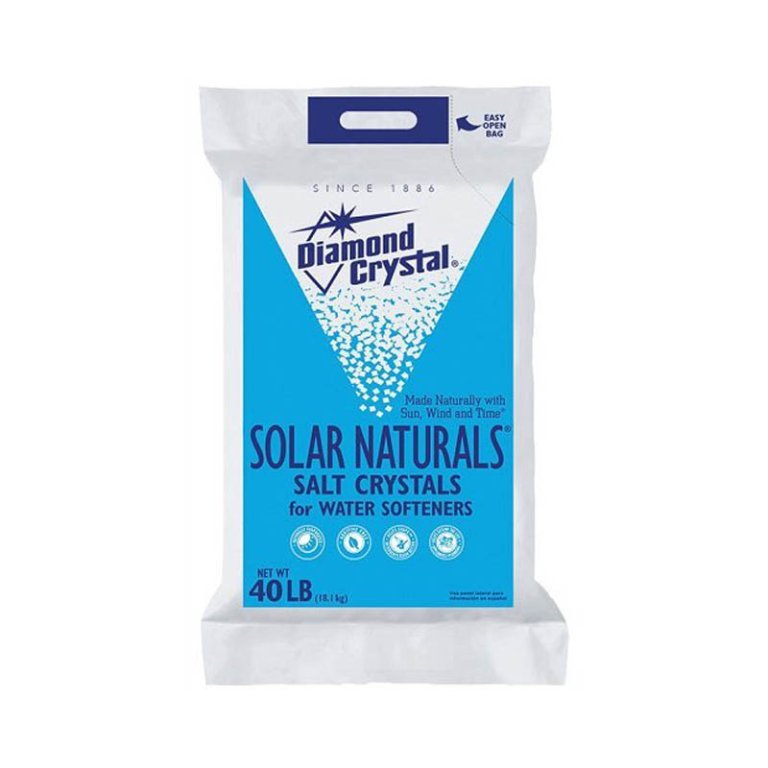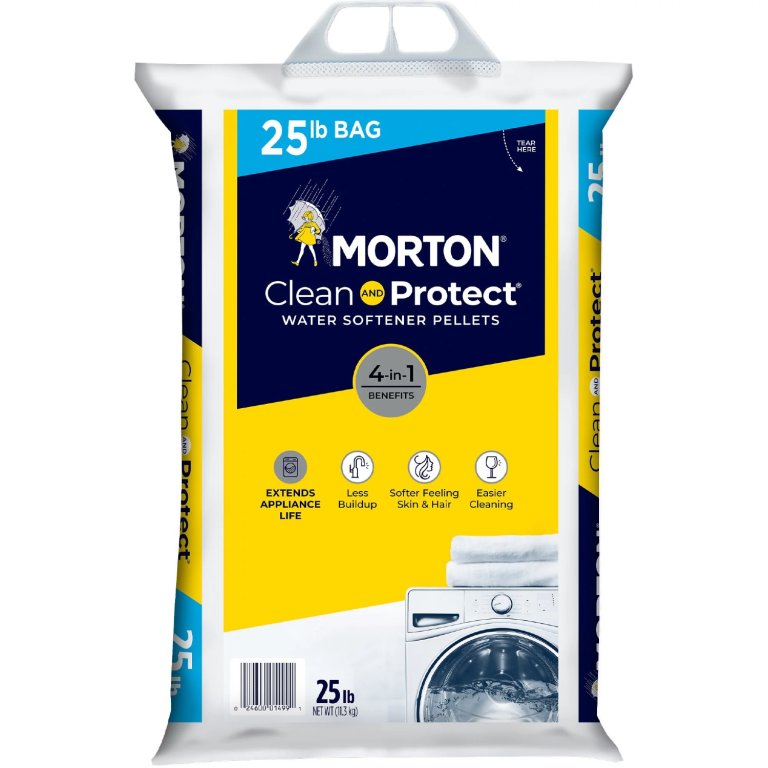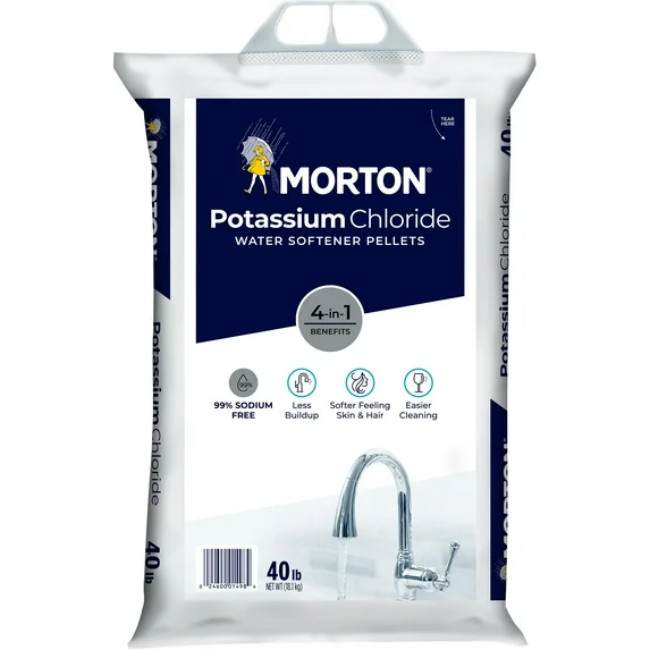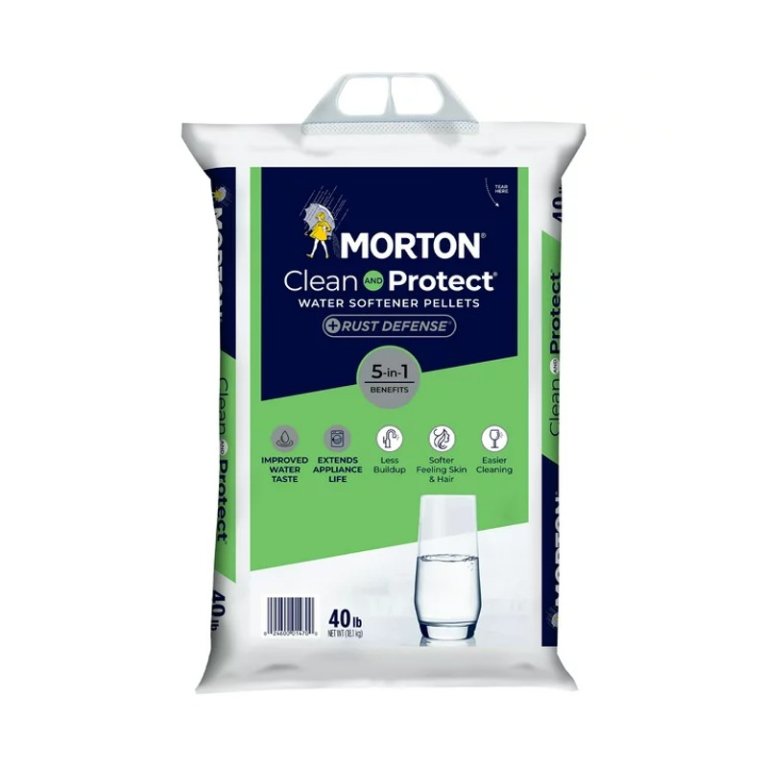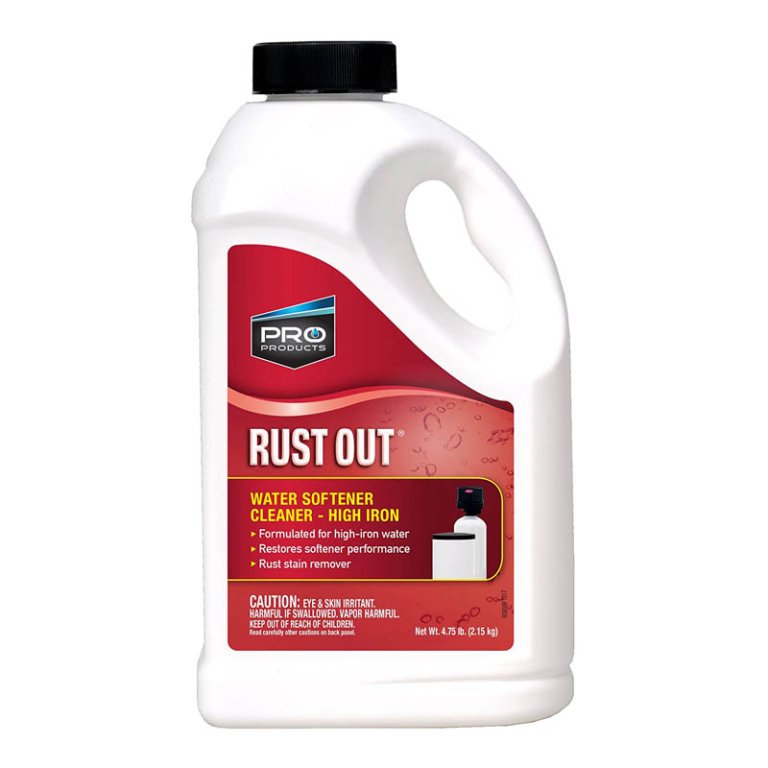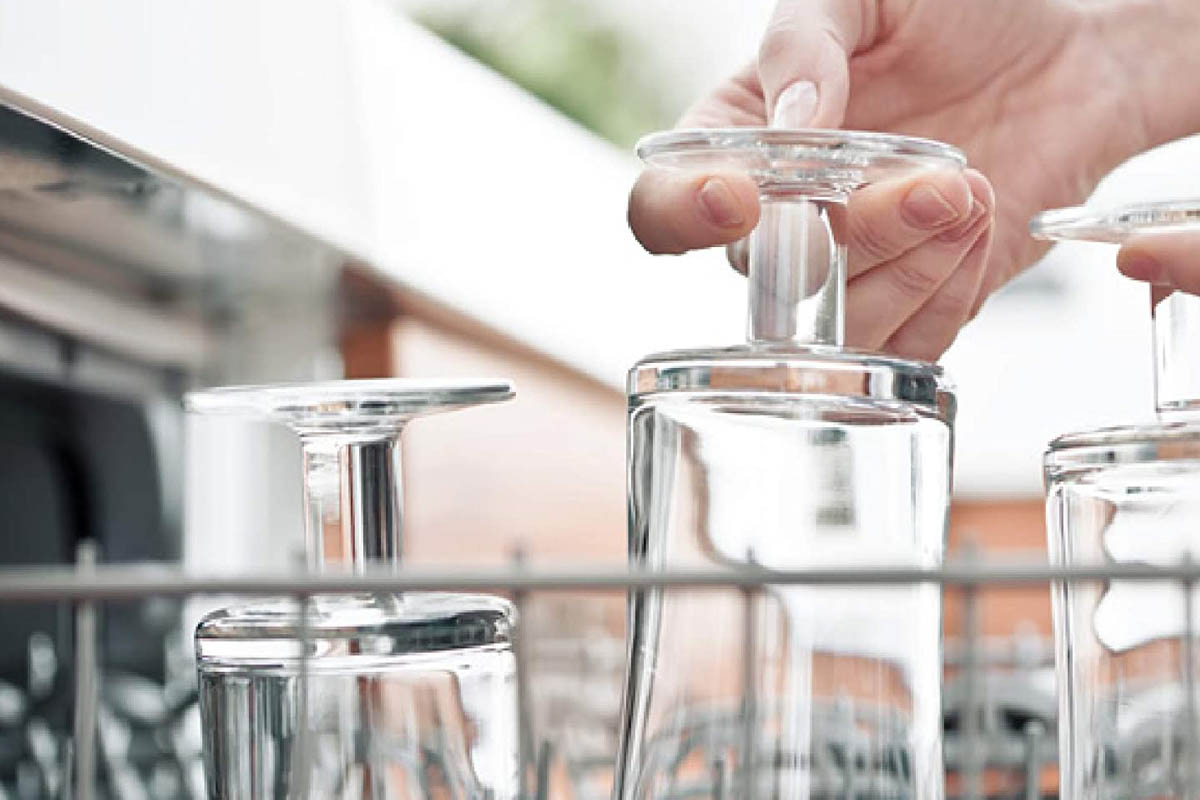
We may earn revenue from the products available on this page and participate in affiliate programs. Learn More ›
A water softener can work miracles by turning rusty water clear, removing unpleasant odors, and preventing mineral buildup that can clog plumbing and damage appliances—but only when it’s filled with the right water softener salt. Softener salt comes in many forms, including salt crystals, salt pellets, rock salt, evaporated sea salt, and even potassium-based alternatives for saltless water softener systems. The quality of the salt you use will directly affect how well your softener performs.
To help you choose the right softener salt for your system, we researched a range of top products and consulted the general manager of a Portland-based home services company for advice before selecting Morton Pure and Natural Water Softener Salt Crystals as our top pick for its effective performance with minimal residue. This guide reviews each of the products that made our list and highlights key factors to consider when shopping for the best water softener salt for your home.
- BEST OVERALL:Morton Pure and Natural Water Softening Crystals
↓ Jump to Review - BEST BANG FOR THE BUCK:Diamond Crystal Solar Naturals Water Softener Salt
↓ Jump to Review - BEST PELLETS:Morton Clean and Protect Water Softener Pellets
↓ Jump to Review - BEST POTASSIUM CHLORIDE:Morton Potassium Chloride Water Softener Pellets
↓ Jump to Review - BEST FOR HIGH-IRON:Morton Clean and Protect Rust Defense Salt Pellets
↓ Jump to Review - BEST FOR MAINTENANCE:Pro Products Rust Out Water Softener Cleaner
↓ Jump to Review

Before You Buy Water Softener Salt
Choosing the right water softener salt involves knowing your water hardness, which you can determine with a water test kit. Most kits use test strips or liquid reagents, and depending on test type, you either dip a strip into a water sample or add drops of reagent before comparing the resulting color to a provided chart. Knowing your water’s hardness allows you to select the salt type and form that will be best for softening your water and keeping the water softener system for your home running smoothly.
Softener Salt Comparison
| Product | Type | Size | Purity |
|---|---|---|---|
| Morton Pure and Natural Water Softener Salt Crystals | Salt crystals | 40 pounds | Not specified |
| Diamond Crystal Solar Naturals Water Softener Salt | Solar sea salt crystals | 40 pounds | 99.6 percent |
| Morton Clean and Protect Water Softener Pellets | Salt pellets | 40 pounds | 99.6 percent |
| Morton Potassium Chloride Water Softener Pellets | Potassium chloride pellets | 40 pounds | 99 percent |
| Morton Clean and Protect Rust Defense Salt Pellets | Salt pellets | 40 pounds | 99.6 percent |
| Pro Products Rust Out Water Softener Cleaner | Dissolvable powder | 22 ounces, 4.75 pounds | N/A (not a salt product) |
Our Top Picks
Whether you’re looking to soften well water or city water, the softener salts below will allow you to enjoy the benefits of your water softener without leaving harmful residues in your brine tank.
Best Overall
Photo: Ace HardwareWhat We Like
- Made from high-purity salt crystals
- Bag has a sturdy plastic handle and easy-tear opening
- Regular use helps prevent hard water stains
What We Don’t Like
- May take longer to dissolve than pellets
Product Specs
- Type: Salt crystals
- Size: 40 pounds
- Purity: Unspecified
This natural alternative to Morton’s standard water softener salt consists of water softening crystals produced by drying sea salt with air. While Morton’s doesn’t state the exact purity level of the finished product, this process generally results in crystals that are at least 99.5 percent sodium chloride. Though that’s not quite as pure as evaporated pellets, Pure and Natural crystals still effectively reduce mineral buildup that can clog pipes and improve the cleaning power of washing machines and dishwashers.
Sold in convenient 40-pound bags with sturdy plastic handles and easy-tear openings, our top pick is simple to carry, pour, and store. Smaller households will generally need to add two bags every 2 months, while homes with four people or more may go through three bags in the same period.
Get the Morton Pure and Natural water softener salt at Ace Hardware, Walmart, or Target.
Best Bang For The Buck
Diamond Crystal Solar Naturals Water Softener Salt
Buy at Tractor Supply Co. Buy at Ace Hardware Buy at The Home DepotWhat We Like
- High-purity solar salt for water softener
- Minimizes softener tank residue and scaling
- Also suitable for de-icing concrete and asphalt surfaces
What We Don’t Like
- Reports of occasional harmless natural mineral specks
Product Specs
- Type: Solar sea salt crystals
- Size: 40 pounds
- Purity: 99.6 percent
Diamond Crystal Solar Naturals water softener salt crystals are made by naturally evaporating seawater using wind and sun, creating a high-purity product that’s 99.6 percent sodium chloride. The crystals don’t contain any additives, making them ideal for those seeking an all-natural softener salt for their water softening system.
As with other salts, Solar Naturals softens water to reduce scaling and mineral buildup in pipes, appliances, sinks, and bathtubs. It also helps extend the life and improve the performance of water-consuming appliances such as clothes washers and dishwashers. Its high purity level helps prevent it from forming a salt bridge, which is a rigid salt crust that sometimes develops in brine tanks. It’s also safe for other applications, such as keeping concrete sidewalks and asphalt parking lots free from ice.
Get the Diamond Crystal water softener salt at Tractor Supply Co., Ace Hardware, The Home Depot, or Amazon.
Best Pellets
Photo: WalmartWhat We Like
- Dissolves cleanly with minimal residue
- Helps minimize rust stains and mineral buildup
- Great for extending appliance life and efficiency
What We Don’t Like
- Can be harder to find in some areas
Product Specs
- Type: Salt pellets
- Size: 40 pounds
- Purity: 99.6 percent
Morton’s Clean and Protect water softener pellets are made from 99.6 percent pure evaporated salt and designed to soften hard water while minimizing residue buildup. Compared to crystals, pellets generally dissolve quicker and cleaner, reducing bridging and residue issues, which can help a water softener last longer.
This pellet salt also helps prevent hard water staining and rust accumulation by removing excess iron and other impurities, extending the life and efficiency of plumbing and appliances. Available in convenient 40-pound bags with sturdy handles, Clean and Protect is also relatively easy to carry and pour, though it may be a bit hard to find in some areas.
Get the Morton Clean and Protect water softener salt pellets at Walmart or Target.
Best Potassium Chloride
Photo: WalmartWhat We Like
- Ideal for low-salt diets
- Increases efficacy of soaps and detergents
- Pellets dissolve cleanly and evenly
What We Don’t Like
- Pricier than sodium chloride softeners
Product Specs
- Type: Potassium chloride pellets
- Size: 40 pounds
- Purity: 99 percent
Ninety-nine percent sodium-free, Morton’s Potassium Chloride Pellets offer an excellent alternative for those with high blood pressure or other health conditions that require a reduced-salt diet. Not only are these pellets free of salt, they also supply potassium, supporting healthy blood pressure.
Like sodium-chloride-based salt for a water softener, potassium chloride softens hard water, helping to prevent scaling on pipes and inside appliances while making soaps and detergents used sudsier and more effective. Sold in 40-pound bags with a built-in handle, they are easy to carry and pour, and most users will need to add about one bag to their hard water softener system each month.
Get the Morton potassium chloride water softener salt at Ace Hardware or Walmart.
Best For High Iron
Photo: WalmartWhat We Like
- Improve water taste and appliance life
- Removes 10 times more iron than plain salt
- Softens skin and hair
What We Don’t Like
- More expensive than basic salt
Product Specs
- Type: Salt pellets
- Size: 40 pounds
- Purity: 99.6 percent
Anyone with high iron content in their water is familiar with the frustration of unsightly rust stains on faucets, tubs, and toilets. Specially formulated to turn orange, rusty water clear, Morton Clean and Protect Rust Defense Salt Pellets are 10 times more effective at reducing iron than standard salt softeners.
This iron-reducing salt for water softeners also reduces scaling in pipes and appliances, helping extend the life of water heaters, washing machines, and dishwashers. It comes in 40-pound bags, which should be added to the brine basin twice every 2 months for small households or three times every 2 months for larger families.
Get the Morton Rust Defense water softener salt at Walmart or Target.
Best For Maintenance
Photo: AmazonWhat We Like
- Removes iron and rust from your resin tank
- Can also be used on toilets, sinks, tubs, laundry, and outdoor surfaces
- Cost-effective for ongoing iron problems
What We Don’t Like
- Must be used alongside water softener salt
Product Specs
- Type: Dissolvable powder
- Size: 22 ounces, 4.75 pounds
- Purity: N/A (not a salt product)
Pro Products Rust Out water softener cleaner is a dissolvable powder specially formulated to chemically remove iron and rust buildup that can coat the resin beds inside water softeners and reduce their efficiency. It works by changing rust (ferric iron) into a clear and soluble ferrous iron state that rinses away without damaging resin or household surfaces.
Because Rust Out is not a salt product, it’s meant to be used as an additive alongside regular water softener salt. The typical first application involves dissolving 1 to 1.5 cups of powder in ½ gallon of cold water and pouring it directly into the brine well or salt tank when salt is at its lowest level, followed by manual softener regeneration. For preventive maintenance, layer ¼ to ½ cup per 40 pounds of salt during refilling to provide continuous dosing at each regeneration cycle. In addition to clearing iron fouling, Rust Out reduces rust stains on bathroom and kitchen fixtures, laundry, dishwashers, and outdoor surfaces.
Get the Pro Products water softener salt (various sizes) at Amazon, Walmart, or Pro Products.
Jump to Our Top Picks

How We Chose the Best Water Softener Salts
In building this list of good water softener salts, we used our own research and experience to find a selection of products that address common issues related to home water systems. In addition to focusing on reputable brands widely available to shoppers, we included different types of water softener salts, such as solar products and sodium-free options, plus formulas designed to deal with iron and rust problems. We also considered price to avoid adding excessively to the cost to install a water softener system.
What to Consider When Choosing Water Softener Salt
Once you’ve decided you need a water softener, the next step is finding the right salt. Read on to learn about the most important characteristics of water softener salt.
Type
Salt for a water softener is available in several types, including crystals, pellets, evaporated sea salt, rock salt, and potassium chloride.
- Salt crystals are created by drying a mixture of salt, brine, and water, leaving about 99.6% sodium chloride. Crystals work well in households with lower-than-average water usage or those that have a two-part water softening system. Otherwise, they’re prone to bridging, which occurs when the salt forms a rigid crust in the brine tank.
- Solar sea salt is produced by evaporating seawater, hence its name. Solar salt is more soluble than other types of salt and is up to 99.5 percent sodium chloride in its purest form. While it’s less expensive than evaporated salt, its higher percentage of impurities prevents it from dissolving easily in harder water, making it ideal for homes with minor water softening needs.
- Rock salt consists of irregularly shaped pieces of salt that resemble rock. While rock salt is cheaper than other types, it’s not as pure, as it contains a significant amount of calcium sulfate. Rock salt doesn’t dissolve as well as purer softener salts and will leave a residue in the softener’s brine basin that needs frequent cleaning.
- Evaporated salt pellets are refined from salt crystals to create nearly 100 percent pure sodium chloride. They dissolve quickly, leave minimal residue, and are ideal for water softeners in high-usage households. While pellets are generally more expensive than crystals, they deliver the most reliable performance.
- Potassium chloride is a good alternative to salt softeners for those with high blood pressure or who otherwise need to watch their sodium intake. Potassium softens water and has the added benefit of supporting healthy blood pressure.
Purity
Purity in softener salt isn’t the same as purity in an under-sink water filter. In salt, the term refers to the percentage of material other than salt that is present in the finished product. The purer the salt, the lower the amount of insoluble material it contains. Most crystal softeners are at least 99.5 percent sodium chloride while evaporated salt pellets are 100 percent.
Pure softener salt lasts longer and doesn’t leave residue in the softener’s brine basin. It also dissolves more easily, which reduces the risk of bridging or clogging and makes the entire system more efficient.
Water Hardness and Usage
The amount of salt needed depends on household size and water hardness. But if you’ve already figured out how to install a water softener, determining how much salt you need is easy.
Small households with two people use approximately one 40-pound bag of salt every month, while those with four members typically go through 1.5 bags in that period. Larger families may need to add two bags each month.
Homes with a high level of minerals in their water will require more salt. If you live in a four-person home and typically add a bag and a half of salt every month, you may need closer to two full bags if your water is particularly hard. Homes with hard water may also want to use evaporated salt pellets to get the most out of each load of salt.
Maintenance Preferences
The form of salt you use can also significantly impact water softener maintenance, as impurities can leave deposits in even the best water softeners. As these deposits build up, the softener must be flushed to remove them. Eventually, these deposits can wear down the internal parts of the softener, shortening its life. Water softener salts with a low percentage of impurities, such as evaporated pellets, leave fewer deposits, extending the time between maintenance for the water softener.
The type of water softener salt can also impact bridging. Bridging occurs when the salt in the softener forms a rigid crust in the brine tank, which prevents salt from dropping down into the softener. Because bridging typically takes place well below the visible top layer of salt in the tank, this problem usually goes undetected until the water quality is impacted. Salts with a greater percentage of impurities are more likely to cause bridging in the brine tank than purer salts.
The Advantages of Using Water Softener Salt
Given the many problems hard water can cause, using water softener salt has quite a few benefits.
- Healthier skin and hair: Hard water can damage hair and dry out skin. In addition to using a water filtration system, a water softener can help prevent these issues.
- Improves taste: Water softeners help eliminate bad tastes created by things like iron, magnesium, fluoride, and sulfur, making it more pleasant to drink.
- Improves the performance of hot water heaters and prevents clogging:Calcium can build up in water supply pipes, slowly causing clogs. Because calcium doesn’t conduct heat, it forces a hot water heater to work harder to warm water, shortening the heater’s lifespan and increasing utility costs. Water softening prevents these issues by removing calcium from the water.
- Improves the performance of soap:Soft water allows soaps and detergents to work more effectively, helping dishwashers and washing machines clean dishes and clothes more thoroughly.
FAQs
If you’re wondering what’s in water softening salt or if you can use it for more than softening your water, read on for answers to commonly asked softener salt questions.two bags every 2 months.
Yes, the type of salt you use in your water softener makes a difference. While all salts will soften hard water, pellet salts work more efficiently because they are purer. Salts that include rock and earth leave residue inside a water softener, requiring the user to clean it more often.
No, softening salt generally doesn’t contain chemicals, as it is usually 99.5 percent or more pure sodium chloride. The remaining 0.5 percent or less is typically trace impurities that softeners filter out.
Yes, you can use softening salt for other purposes, such as melting ice and snow from your walkway or killing weeds in your garden. If the softening salt is food safe, you can even use it to pickle foods or make ice cream.
How often you should add salt depends on the size of your household and the hardness of your water. Homes with average hardness and four people generally add approximately three bags every 2 months, whereas those with two people might only add two bags every couple of months.
According to Joe Slom, General Manager of Wolcott Services, a Portland-based home services company, “Adding too much salt to a water softener’s brine tank can create a crust or a solid mass inside the tank (sometimes called ‘salt bridging’ or ‘mushing’). Like a pipe clog, the crust or mass of salt creates a blockage in the brine tank and prevents the softener from functioning properly. In addition to costing you extra money, it reduces your water quality.”
If your water softener needs more salt, the first sign will be harder water than usual. Your shampoo may be less sudsy, or your clothes might not be coming quite as clean. Wolcott Services’ Joe Slom says: “Typically, a system’s brine tank needs to be about half filled with salt. When a system runs low on salt, it may not be able to go through its regeneration process, and you will see a return of your hard water.”
Potential downsides of salt-based water softeners include added sodium in water, environmental impact from brine discharge, and regular salt refilling. However, these issues are generally minimal, and benefits like preventing scale buildup, increasing appliance lifespan, and improving water quality typically far outweigh them.
